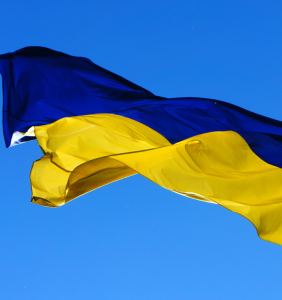Ukraine
The Russian invasion of Ukraine on 24 February 2022 dramatically changed the environment for peace operations. After its temporary evacuation after the attack, the EU Advisory Mission EUAM has resumed operations on the ground with an expanded mandate. The OSCE Office of the Project Co-ordinator in Ukraine (PCU), however, needed to cease its activities in June 2022 as its prolongation failed due to a Russian veto. Dedicated participating States of the OSCE therefore established a Support Programme for Ukraine (SPU).
ZIF Briefing on Options for Ukraine
Our Senior Researcher Dr. Andreas Wittkowsky compiled a briefing on options and needs for potential future multilateral peace operations in Ukraine.

EU Advisory Mission Ukraine (EUAM Ukraine)
Since December 2014, the European Union Advisory Mission (EUAM) has been advising Ukraine on the reform of its civilian security sector (police, prosecutors, courts, and correctional system, among others).
The European Council substantially expanded the mission's mandate in 2022 and 2023. Since then, EUAM has also supported Ukrainian authorities in investigating international crimes resulting from the Russian war of aggression, as well as Ukrainian security institutions in liberated and adjacent areas. Moreover, the mission has been assisting Ukraine's preparations for EU accession since the country gained candidate status in June 2022.
Following the temporary evacuation as a result of the Russian incursion, the international mission members have since returned to Ukraine. They are mainly based in the regional office in Lviv, the headquarters in Kyiv, and increasingly in other regions. ZIF deploys about 15 civilian experts to the Mission.
OSCE Support Programme for Ukraine
On November 1, 2022, the OSCE Support Programme for Ukraine (SPU) was launched. The SPU supports projects that build on the OSCE's former copperation with state agencies and non-governmental organizations. Some efforts are focused on immediate security needs, such as humanitarian demining, addressing chemical threats, monitoring of environmental damage from the war, and protection of displaced persons from risks of trafficking in human beings. Others invest in the stability of the country over the longer term, by strengthening tools of human rights protection, supporting judicial reforms, enhancing constitutional justice, media freedom, participation of civil society and youth in post-war reconstruction, and developing the system of psychological support for conflict-affected people.
To oversee the SPU, the 2023 OSCE Chairman-in-Office, is the North Macedonia’s Foreign Minister Bujar Osmani, has appointed Slovak diplomat Marcel Peško as Special Representative – Project Co-ordinator in Ukraine. The projects are funded by voluntary, extrabudgetary contributions from committed OSCE participating States and partners.
Background (German only)
Interviews with Ukraine expert Dr. Andreas Wittkowsky:
- "Nebel des Krieges, Nebel der Sanktionen." (bruchstücke blog)
- "Diplomatisch tut sich einiges." (bruchstücke blog)
- "Nichts weist auf einen Kompromisswillen des Kreml hin." (bruchstücke blog)
- "Waffenstillstand fordern? Gut gemeint, nicht durchdacht" (bruchstücke blog)
- "Putin geht es um weit mehr als um die Unterwerfung der Ukraine." (bruchstücke blog)
Media appearance with Ukraine expert Wilfried Jilge:
- "Gehört halb Osteuropa zu Russland? Wie Putins Sowjet-Trauma Kriege entfacht" (Redaktionsnetzwerk Deutschland)